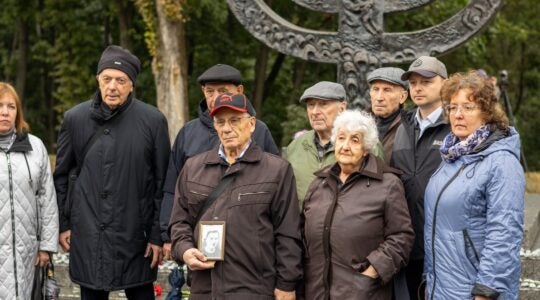KIEV, Ukraine (JTA) — Ukrainian Jews held two ceremonies in Kiev to remember the Jewish victims of the Babi Yar massacre.
Sunday’s dueling ceremonies, according to some observers, illustrate the lack of unity within the Jewish community of Kiev and Ukraine on the eve of upcoming presidential elections.
Members of the Kiev Jewish community, rabbis and diplomats attended Sunday’s main ceremony near the menorah-shaped Holocaust memorial erected in 1991 at the site of the Babi Yar massacre. More than 100,000 Jews were killed there by Nazi gunmen and local collaborators.
Among the participants were Zina Kalay-Kleitman, Israel’s ambassador to Ukraine; Rabbi Yaakov Dov Bleich, a chief rabbi of Ukraine; and Evgeniy Chervonenko, first deputy mayor of Kiev and a Jewish leader in Ukraine. Students of Jewish schools also participated.
Chervonenko announced at the ceremony that Kiev Mayor Leonid Chernovetzky had vetoed a plan to build a hotel at the Babi Yar site.
At the same time, the Jewish Forum of Ukraine, the Anti-Fascist Committee and the Association of Former Prisoners of Concentration Camps and Ghettos joined with left-wing political parties for a ceremony nearby at a monument to all the victims of Babi Yar.
Both events culminated in memorial prayers led by Bleich at the menorah, and by Rabbi Aleksandr Dukhovny, spiritual leader of the Ukrainian Reform Jewish movement at the monument to all victims of Babi Yar.
Iliya Levitas, head of the Jewish Council of Ukraine, told JTA that the meeting at the monument to all the victims of Babi Yar was an attempt to split the Jewish community.
“Traditionally the [entire] Jewish community marks Holocaust Memorial Day on this day," he said.
The ceremonies memorialized more than 33,700 Ukrainian Jews killed over two days in September 1941, when occupying Nazi troops forced local Jews into a ravine at Babi Yar and then shot them to death. The Nazis also murdered thousands of Red Army prisoners of war, members of the Ukrainian national resistance movement, gypsies and mentally disabled people there.
In more recent years, Babi Yar came to symbolize Soviet attempts to suppress Jewish identity. When a memorial to the victims was erected there 35 years after the tragedy, it mentioned only “citizens of Kiev and prisoners of war.”
On Tuesday morning, Ukrainian President Viktor Yuschenko, Vice Premier Ivan Vasyunyk and other officials laid flowers at the monument to all the victims of Babi Yar.
Later in the day, diplomats, Holocaust survivors and other Ukrainian Jews, as well as representatives of ethnic and religious groups, commemorated the killings.
In the evening, Prime Minister Yulia Tymoshenko, deputy chairman of the Ukrainian Parliament Nikolay Tomenko, and parliament and Cabinet ministers also laid flowers at the monument to the Babi Yar victims and to the memorial of the Organization of Ukrainian Nationalists victims, according to the Ukrinform state news agency.
JTA has documented Jewish history in real-time for over a century. Keep our journalism strong by joining us in supporting independent, award-winning reporting.





